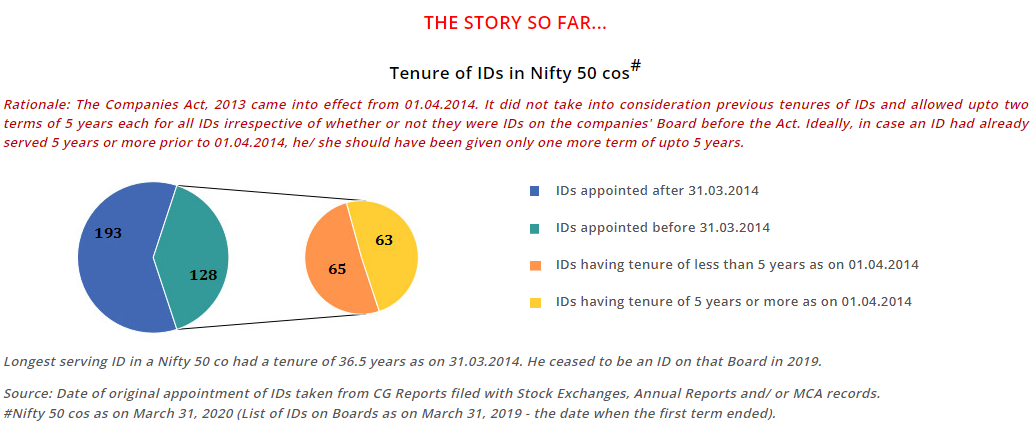
Corporate Governance Demystified
Excellence Enablers Private Limited
November | 2020
A crisis is a good time for taking tough decisions. Often it is Hobson’s choice. Resultantly, the decisions may not be right. Is selling PSUs and PSBs a palliative or a cure? The Jury will be out for quite some time.
Editor
PRIVATISATION AND GOVERNANCE

M. Damodaran
Chairperson, Excellence Enablers
Former Chairman, SEBI, UTI and IDBI
Privatisation, or rather, talk of privatisation, is in the air. There are reports that the Government of India is looking at the possibility of exiting completely from Public Sector Banks (PSBs). This move towards privatisation would be in addition to the disposal of Public Sector Undertakings (PSUs), which have been identified for being bid goodbye.
It is not unusual for an owner facing serious economic problems to look at existing assets and to identify those the disposal of which could provide some immediate relief. If the reasons for the proposed privatisation are purely economic, and the step is intended to fill the coffers to meet the competing claims thereon, no one would seriously disagree. There would be those that express concern about family silver being sold to meet immediate expenditure needs. While that argument might not be without merit, there are situations in which no easy solution presents itself. As for the PSBs, it would be difficult to imagine a world without them, given economic disparities in the population, and the need for instruments to implement banking and banking-related schemes that are targeted to address the requirements of the poor and needy. Once PSBs recede into history, the truth will emerge that private sector banks, with their significantly urban and metropolitan presence, will not be able to step up to the plate.
If better economic performance is expected to be a natural outcome of privatisation, it will suffice to look back at the history of the cotton textile industry to draw appropriate conclusions. More than a hundred cotton textile mills, all under private ownership, including of some storeyed owners, folded up in the 1970s. Post their nationalisation, the National Textile Corporation, a PSU, nursed back many of them to reasonable health. Even in recent times, there have been significant blowouts in privately owned entities, leaving no one in doubt that efficiency is a function of management, and not of ownership.
While the economic argument would have staunch proponents on both sides, the battlelines do not seem to be as clearly drawn when it comes to Corporate Governance. Every attempt at privatisation, including part-privatisation, has had the pro-market cheerleaders talk in terms of how market discipline and watchfulness, post the listing, would make commercial undertakings function significantly better. The fondly-held belief is that post-listing, problems such as conflict of interest, the overbearing attitude of the majority shareholder, and the consequent oppression of minority shareholders, would disappear overnight. The harsh reality is that nothing of that kind has happened. Therefore, if Corporate Governance standards in PSUs, including PSBs, leave a lot to be desired, as they indeed do, the solution cannot lie in privatisation.
What then could improve Corporate Governance standards in PSUs? The first requirement is for the majority shareholder to recognise that it is, notwithstanding its size, one among equals in the community of shareholders. A significant shareholding should not translate to the shareholder being the recipient of information that is not made known to other shareholders.
Asymmetry of information is not the only problem. The unwillingness to recognise the difference between ownership and management is the root cause of poor Corporate Governance standards in PSUs and PSBs. A series of directions, including some which admittedly are meant to serve the public good, reduces the Board of Directors to the role of executing agents. On occasion, the directions are given to the management, and the Board of Directors gets to know about them along with the rest of the world, after the directions are implemented. While conversations abound, in which these are described as Board-managed entities, there have been extreme instances where members of the Board awoke one morning to discover that their Chief Executive had been changed. What lends macabre humour to this state of affairs is the unhappy fact that most of the Maharatnas are without the minimum complement of Independent Directors (IDs). It is easy to argue that when a Government appoints a person as ID, that person cannot, in normal circumstances, be expected to act independent of Government. Much the same argument would apply in the case of private sector undertakings, where, notwithstanding the role assigned by statute to the Nomination and Remuneration Committee, the promoter or major shareholder ends up getting the IDs that she/he would like to have on the Board. We seem to have moved from the spoils system of the past, where the promoter, without any pretence, could bring her/his friends into the Board. The present situation adds nothing more than a procedure, that, more often than not, has the same outcome.
Cleanliness has long been reckoned as being next only to Godliness. The swachh bharat movement has been a phenomenal step in making our surroundings cleaner. However, in the process, PSUs have been not so gently persuaded to part with the entire corpus of Corporate Social Responsibility (CSR) funds in at least one year to construct toilets, some of which have never been used. If this does not strike at the root of Corporate Governance, it is difficult to identify what else can.
There is one experiment that the Government would do well to consider. It could identify two major PSUs and two major PSBs which have Managing Directors/ Chief Executive Officers with a remaining tenure of at least 3 years. The Boards of these entities should be suitably revamped to bring in persons with diverse experience, who are not dependent on these Board positions, and are unafraid to speak their mind. The Government Directors on these Boards should be the only medium through which the Government should communicate its instructions/ advice to the Board. There should be no written directives that pre-empt decision-making by the Boards. If Board members have a point of view that is different from what is communicated to them, through the Government nominee on the Board, it would be for the Government nominee to take back to the Government, the views expressed by the Board members so that no final decision is taken without factoring in the valuable inputs received from the members of the Board. This experiment could be tried for 2-3 years to help determine whether enlightened Government ownership is consistent with good governance and good performance. While no odds are offered on the outcome of this exercise, it is a reasonable conclusion that these entities will not be found to fall short of both expectations from them, as well as the performance levels of corresponding private sector entities.
There is no dictionary which indicates that reform, efficiency and good governance are synonyms of privatisation. Yet, the argument can be, and will continue forever and a day, that privatisation will suddenly usher in better efficiency, better performance and better governance. This is as good an occasion as any, to recall the words of Alexander Pope (with some liberty taken) –
For forms of ownership let the pundits contest;
Whatever is best governed is best.
Excellence Enablers recently co-hosted a webinar with NSE on Instruments of Corporate Governance. This was the third of a three part series – CONVERSATIONS ON CORPORATE GOVERNANCE. For more, click here

READERSPEAK – WHEN CONTEXT AND CONTENT CONVERGE
Deepak Satwalekar, Former MD and CEO, HDFC Standard Life Insurance and Independent Director on several Boards
“I don’t think retention of profits is anti-shareholders. It depends on the growth stage of the company, and its need for capital. This is really a capital allocation decision and the Board would be well within its judgmental duties in deciding to prefer the longer-term interests of shareholders.”
S Hajara, Former CMD, Shipping Corporation of India
“Plugging of loopholes by which some entities try to evade compliance on technical grounds is also a welcome move. Hope the directional change is maintained going forward and the level of corporate governance and compliance continue to improve. ”
Do let us know of any specific issues you would like to see addressed in subsequent issues.
Excellence Enablers
Corporate Governance Specialists | Adding value, not ticking boxes | www.excellenceenablers.com

 (292KB)
(292KB)